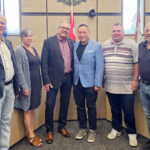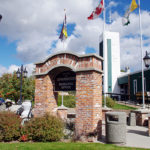Home »

Kootenay physician wins award to advance rural research
The East Kootenay Regional Hospital (EKRH) is Interior Health’s fourth and newest clinical research site thanks in part to the efforts of Dr. Denise Jaworsky, an internal medicine physician at IH.
With an initial grant from Accelerating Clinical Trials Canada, Dr. Jaworsky and her team are establishing an integrated and sustainable clinical research program in the Kootenays.
Now, Dr. Jaworsky has won a major award from Michael Smith Health Research BC that will further her and her team’s efforts. The Health Professional-Investigator Award supports health professionals who are actively involved in patient care to build their health research programs, train the next generation of scientists, and make significant contributions to their field.
“Dr. Denise Jaworsky’s Health Professional-Investigator Award is significant,” said Dr. Devlin Harris, executive medical director, Quality, Engagement and Research at IH. “This award allows her to continue her research focused on rural health issues, and lead research in the East Kootenays and Interior Health. This award will have a lasting impact on patient care and will be a catalyst not only for research in Interior Health, but for Dr. Jaworsky as a promising rural clinician-scientist.”
When Dr. Jaworsky was practising medicine in Northern B.C. during the pandemic, she saw first-hand how difficult it was for rural and remote communities to access innovative treatments.
“We were seeing person after person die and sending people away across the province for care,” she recalls. She wanted to do something more for her patients and tried to take part in clinical trials for new COVID-19 drugs. But the research infrastructure in the north was just starting to develop and the timing wasn’t right to initiate a clinical trial.
When an opportunity came along for her to move to the Kootenays and build a program in Cranbrook, she jumped at the chance.
Dr. Jaworsky’s approach to building the EKRH Clinical Research Program has been unique. Rather than seeking out clinical trials to present to the community, her team is engaging with the community and discovering people’s needs.
Jason Curran is manager, Rural Research & Physician Engagement at IH. “From the start, Denise has been engaging the community and partners in building her clinical research practice,” he says. “She’s really enabling the community to direct the program.”
The team is forming a strong patient partner advisory board so people in the community have a say into how the program unfolds, and what kind of clinical trials are brought to the community. The goal is to be responsive to the needs of our rural populations by building a diverse advisory committee of patient partners, health-care providers, Elders and IH leaders.
Dr. Jaworsky wants to ensure their research is holistic and inclusive. “Research traditionally has not been a safe space for a lot of vulnerable populations. Historical injustices have also tarnished research and people are apprehensive about it—understandably so,” she says. “It’s important that we include diverse voices and especially Indigenous voices, so we approach research activities in a way that’s culturally safe.”
With the help of a grant from Canadian Race Relations Foundation, the team held an Indigenous Peoples’ Pre-Engagement Research Ethics Workshop. This workshop was delivered by Ktunaxa Scholar Michele Sam in partnership with College of the Rockies and instructor Stephanie Obara.
The workshop included guest researcher Dr. Doris O’Brien-Teengs, who is an Omushkego Cree and Irish Canadian scholar whose research has included 2-Spirited People of the First Nations and the Ontario Aboriginal HIV/AIDS Strategy. Along with her mother, Annie O’Brien, they spoke about the research processes and ethics of her PhD dissertation, The silence that followed Indian Residential Schools: Sharing our stories and reconnecting oral history among OMushkego Cree family members in Ontario.
Both Denise and Stephanie had worked with Doris in the past, and this gathering reconnected them speaking to the importance of relationships in research opportunities.
Lisa Larkin and Jen Siemens are clinical research coordinators for the program. As coordinators, they liaise with patients, educate health-care providers and community partners about the program, advocate for trials, and organize and conduct daily study activities. Jen is also an instructor at the College of the Rockies, one of the program’s partners.
Within the program is a unique “meta” project that is studying and evaluating how the program is being built—as it’s being built.
Both Jen and Lisa are helping to coordinate the project. “Our project will study the barriers to rural research programs,” said Lisa. “We’re applying implementation science to figure out where the gaps are, and what our rural community needs. The goal is to gather knowledge that can be used by rural and remote programs across B.C. and Canada.”
“As a registered nurse committed to enhancing health care for Canadians in rural and remote communities, I’m excited to be part of the EKRH clinical research team,” said Jen. “My role supports the collection of valuable data from rural settings, supporting health-care delivery beyond urban centres.”
“This program provides opportunities for Cranbrook and area health-care providers and residents, as well as students and faculty from the College of the Rockies, to engage in all aspects of research, from advising to participation,” she added.
For those living in rural settings, it can be difficult to access and participate in clinical trials. Most clinical research taking place in Canada occurs in larger urban areas. For rural patients, this means missed opportunities to participate in clinical studies and contribute to medical knowledge, and barriers to accessing new beneficial treatments.
“We want to advance equity in health care,” explained Dr. Jaworsky. “There are so many smart, creative, motivated and innovative people in rural communities. They want to be involved. We had more than 30 people show up at our first meeting in Cranbrook.”
Clinical research is essential to enhancing medical care, and helps ensure treatments are safe and effective. By advancing scientific knowledge and data, we can improve the ways we provide care.
Clinical researchers might study new ways of using an existing medicine (for example, dosing), or a better way of doing a medical procedure. Researchers can determine the safest and most beneficial ways to treat patients, while providing the medical community a deeper understanding of conditions and diseases.
By participating in a clinical trial, a patient can have better health outcomes, benefit from closer monitoring of their condition, and a better understanding of the condition and medications.
Lead image: Dr. Denise Jaworsky has won a 2024 Health Professional-Investigator award from Michael Smith Health Research BC. The award will support her and her team’s efforts to advance rural research in the Kootenays. Interior Health photo
Interior Health







